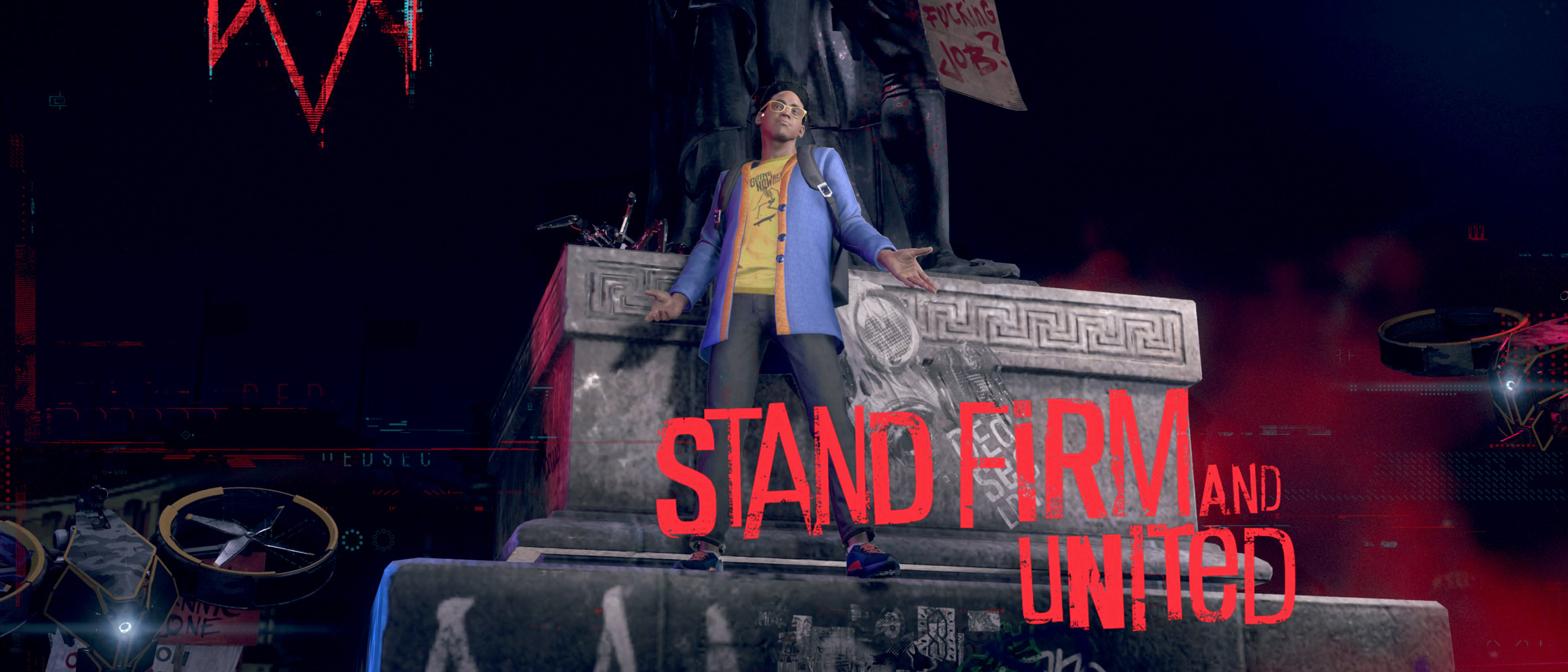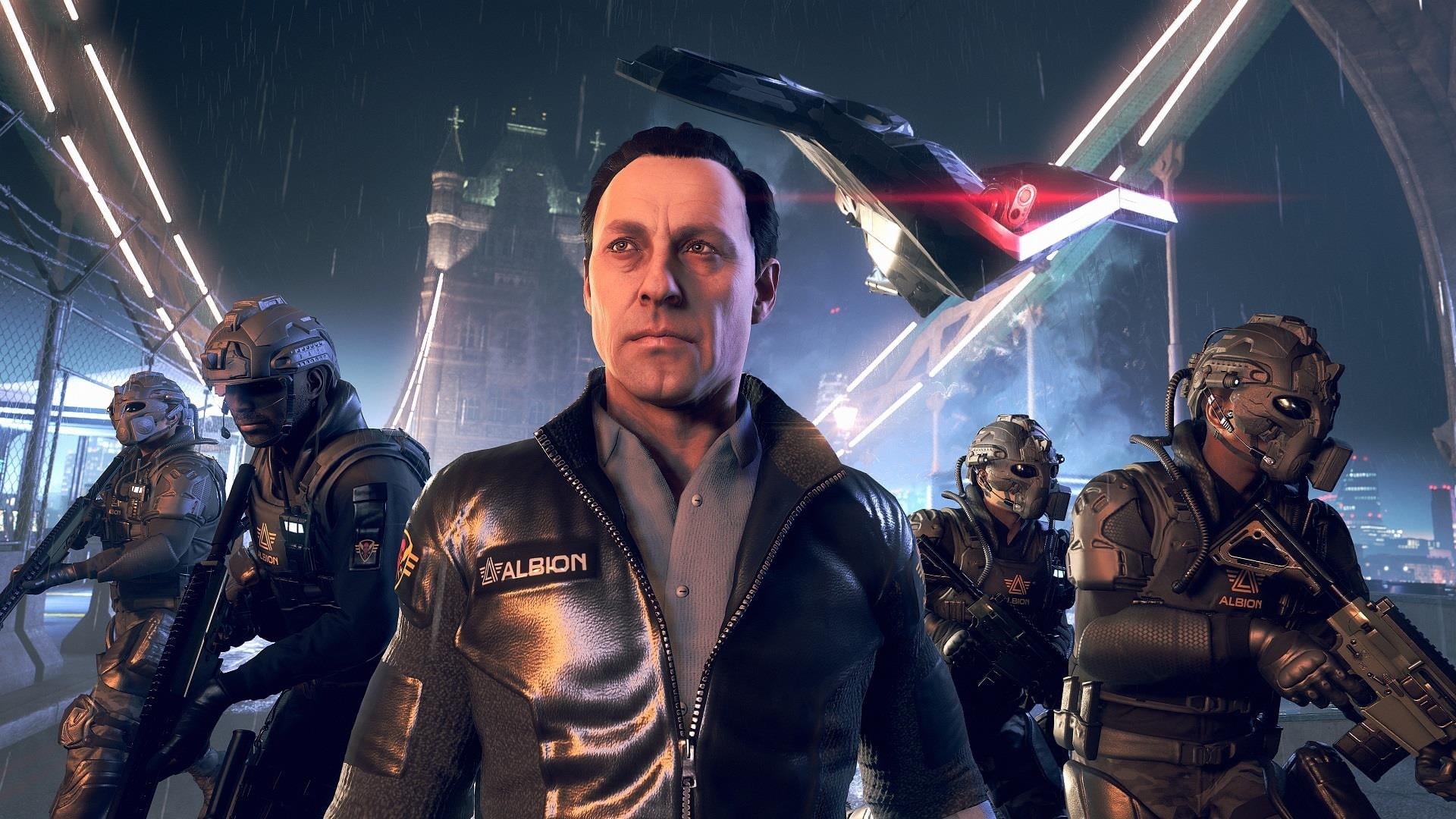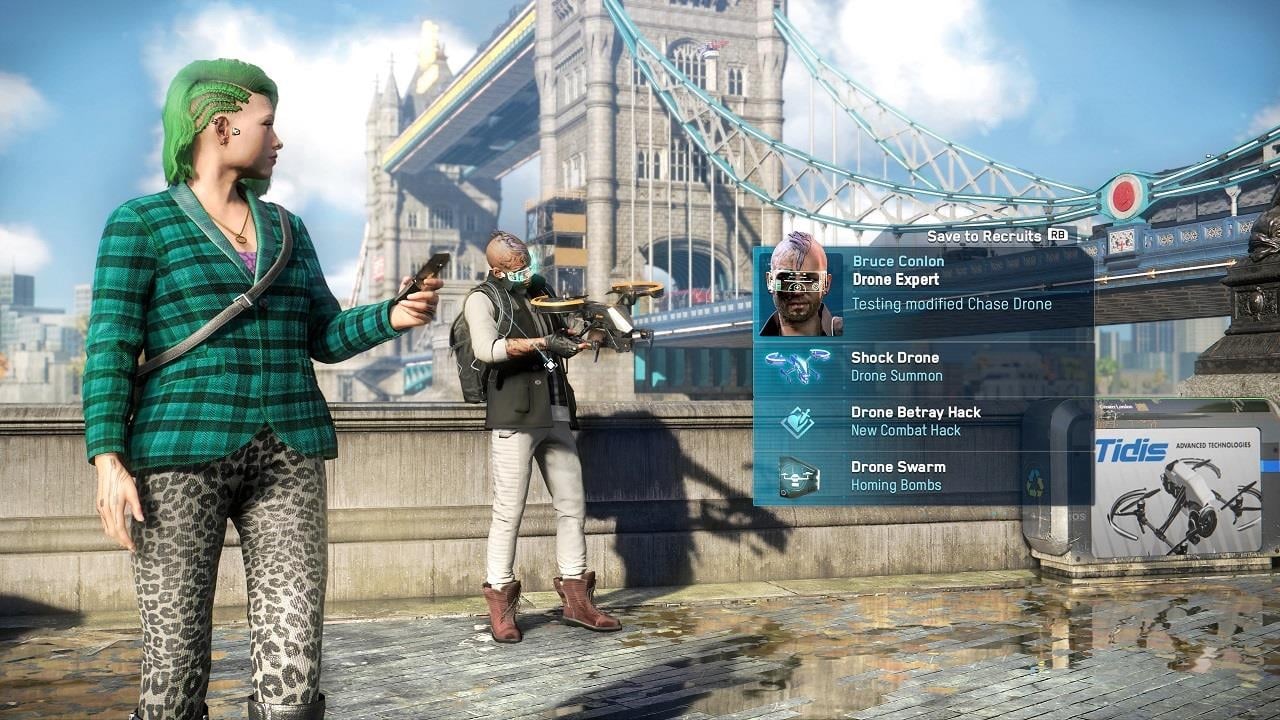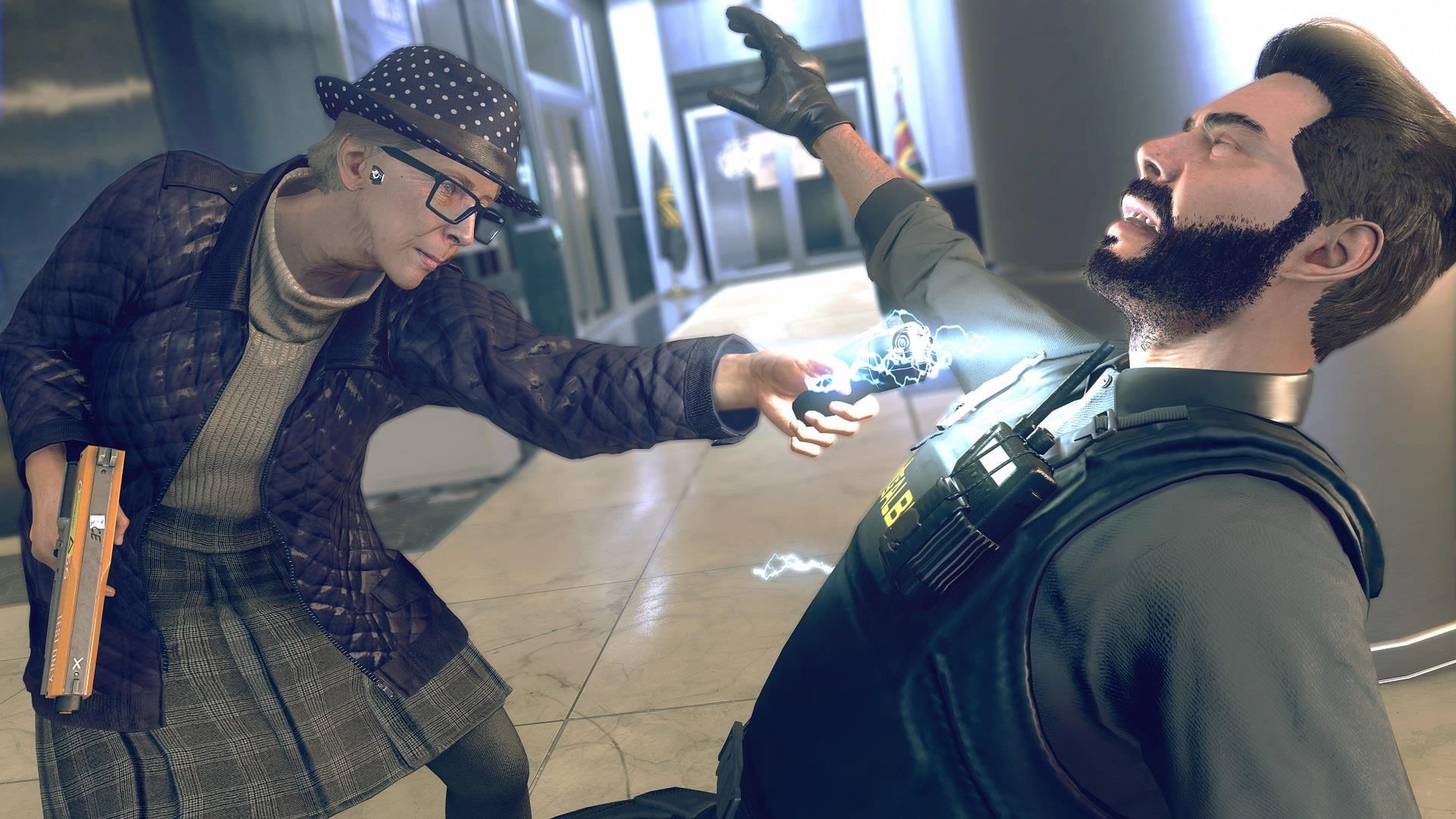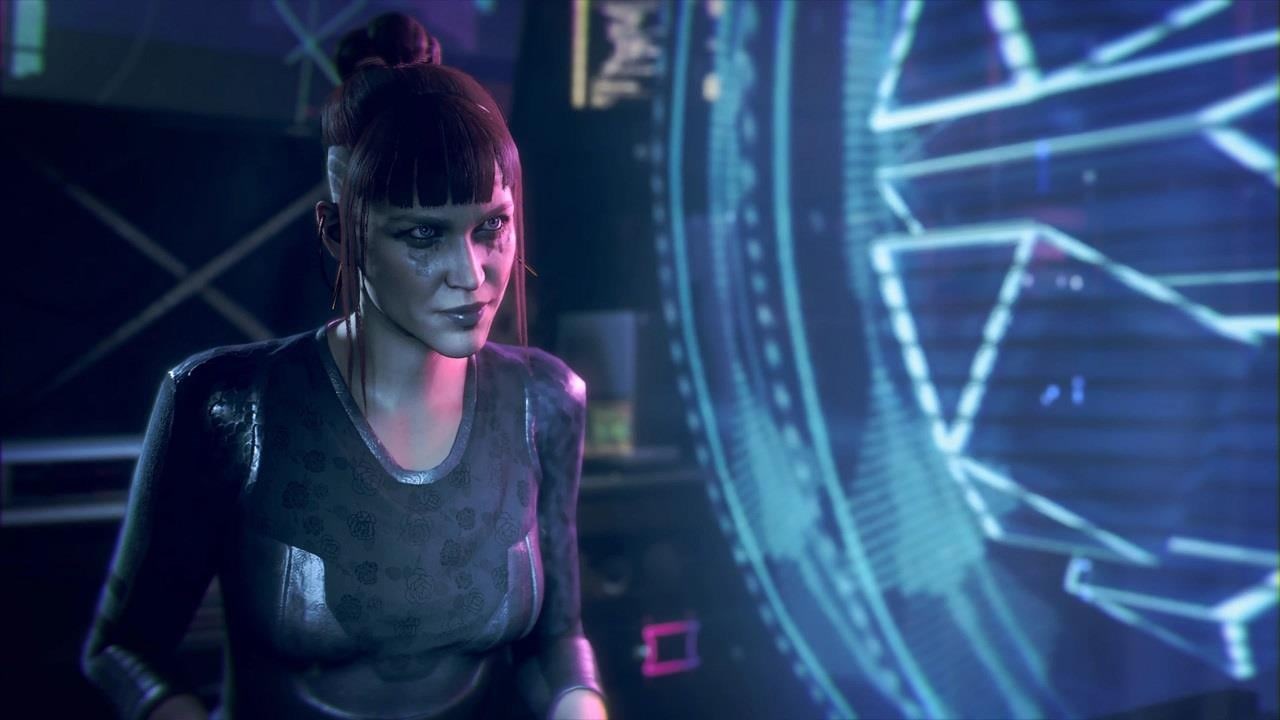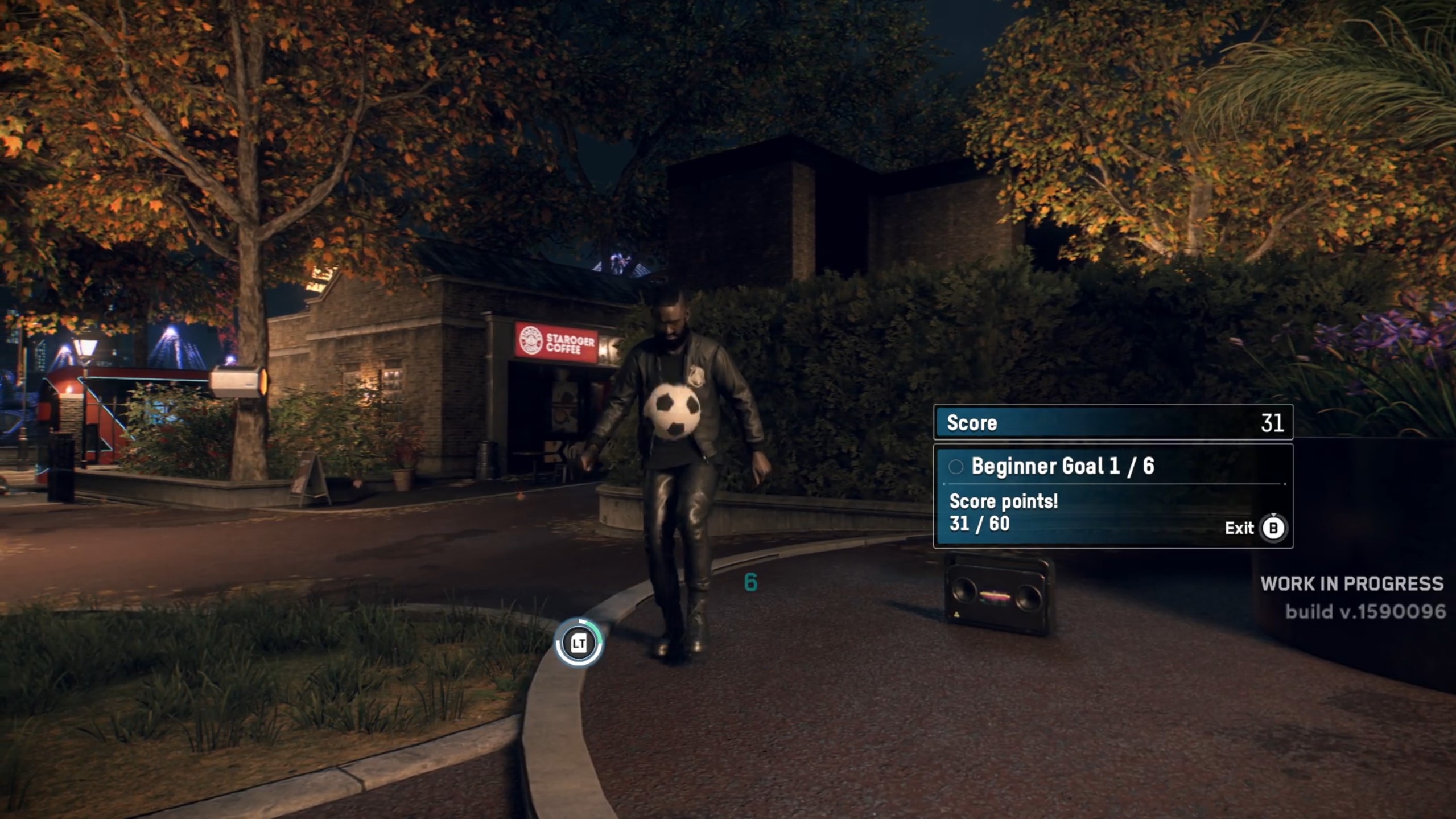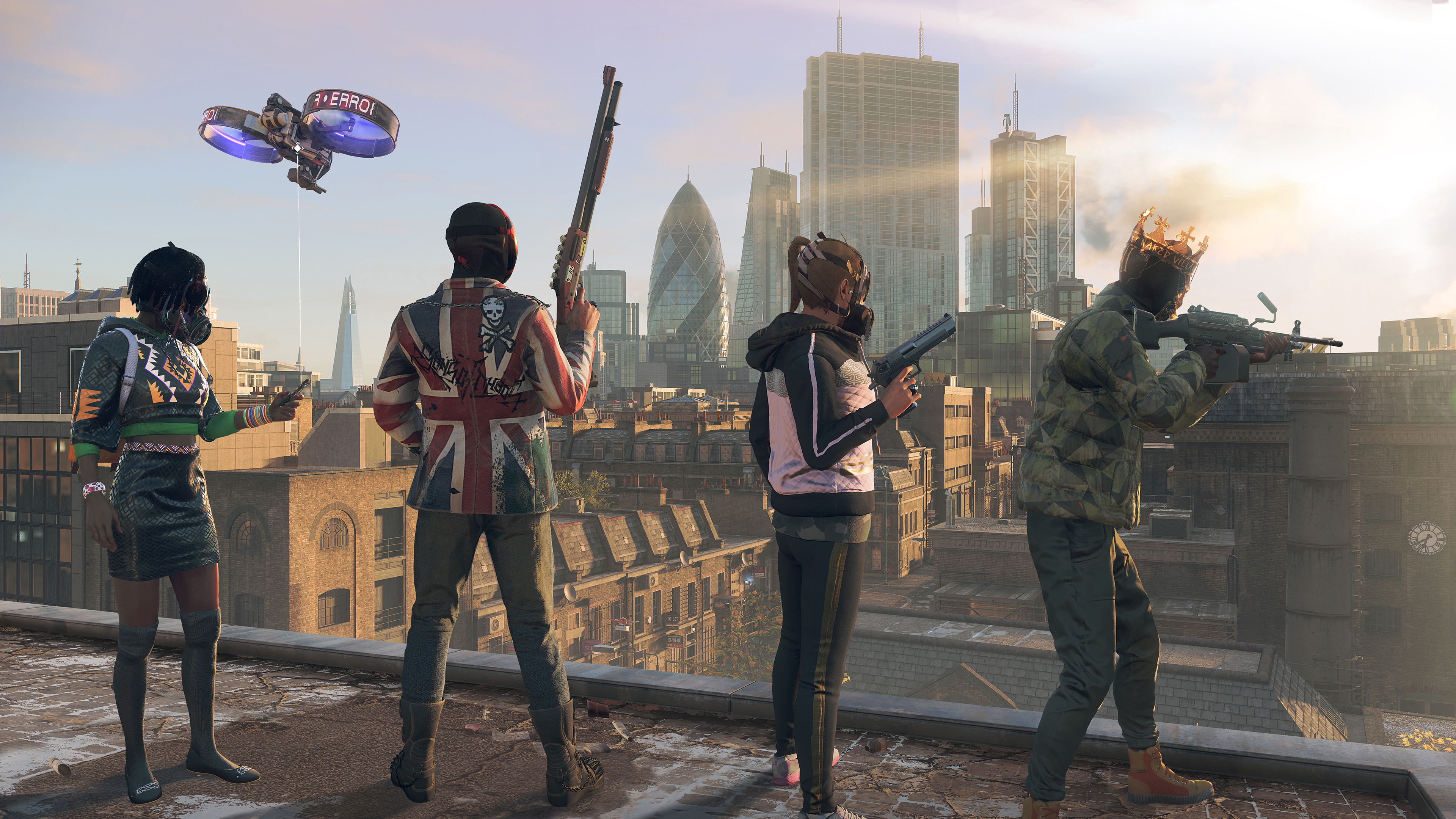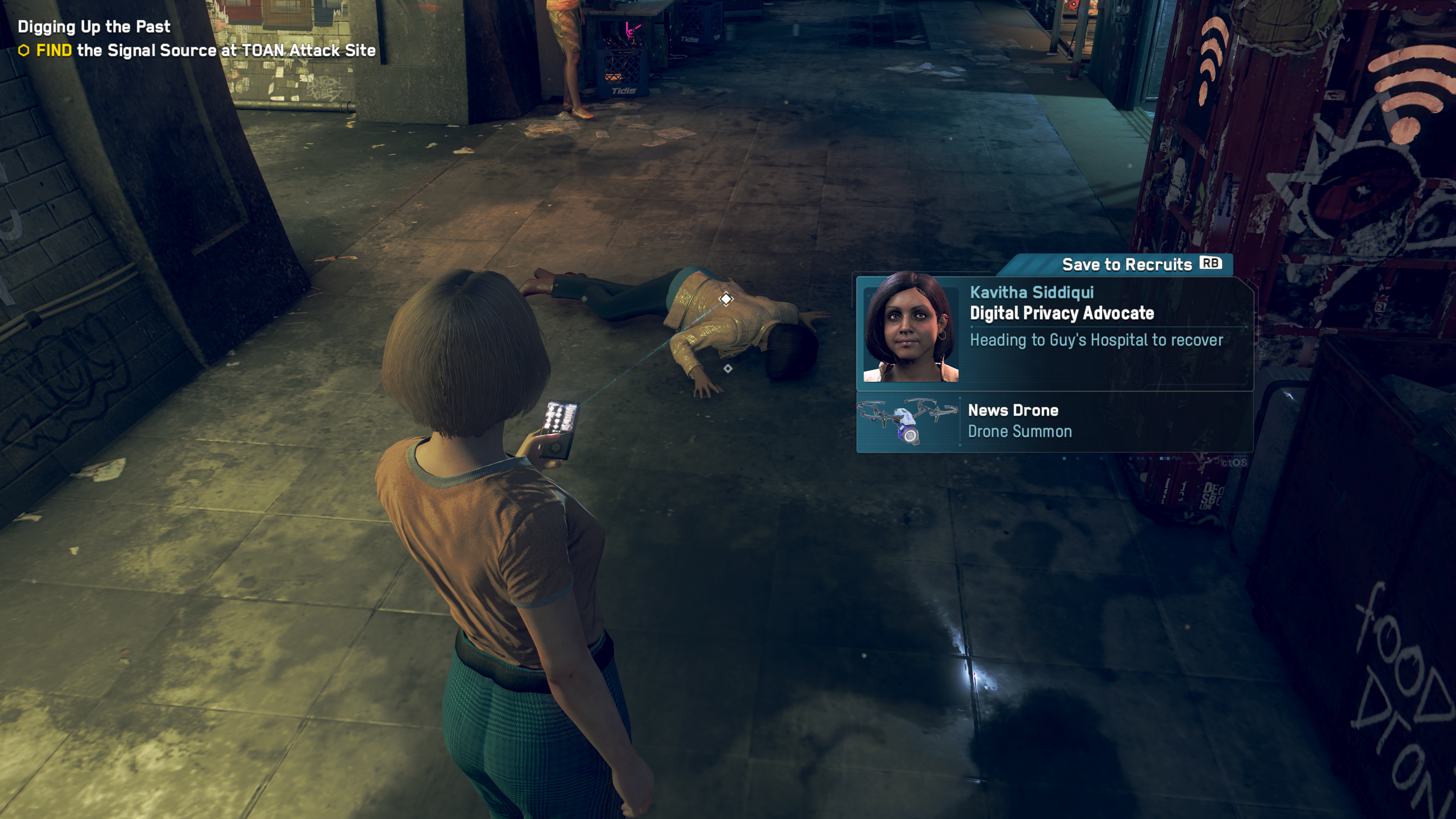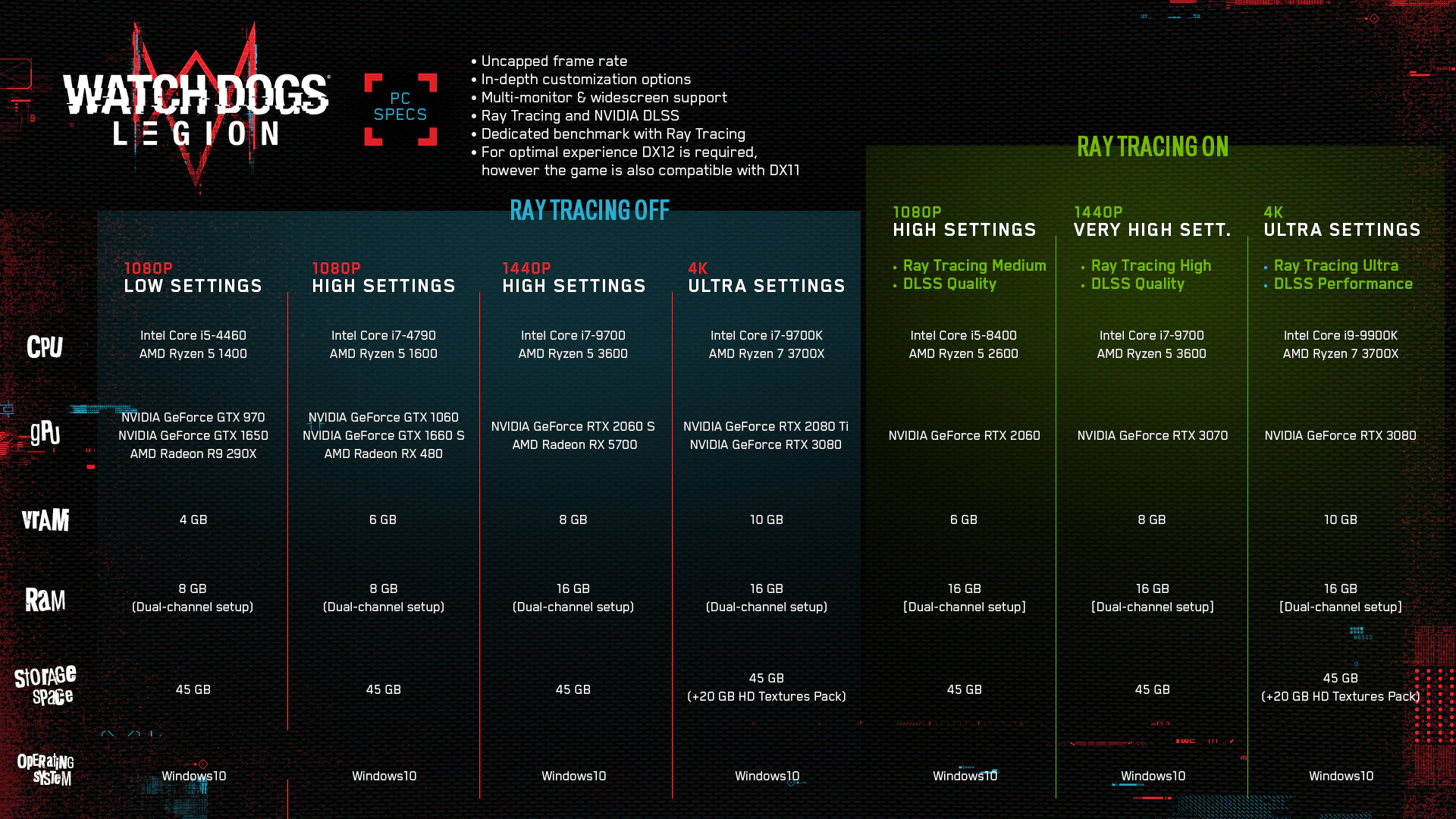Laptop Mag Verdict
Watch Dogs: Legion didn’t impress with its gameplay or dialogue, but the game’s multiplayer potential and gorgeous open-world might be its saving grace.
Pros
- +
Gorgeous world design
- +
Play anyone mechanic is creative
- +
Great multiplayer potential
- +
Good soundtrack
- +
Shopping is hella fun
Cons
- -
Goofy dialogue
- -
Stiff gameplay
- -
Boring mini-games
- -
Too much spiderbot
Why you can trust Laptop Mag
When I first got my hands on Watch Dogs: Legion, I didn’t walk away impressed, but as I’ve been playing it on my own, my state of mind has drifted from open-minded to bored to somewhat intrigued to clothing shopping addict.
As I’ve said before, Ubisoft crafted an incredibly gorgeous futuristic London city-scape that will immerse you for hours, and being able to play as any character you meet is a fun novelty, but that excitement wears off quickly. The cool premise is downplayed by goofy dialogue and stiff gameplay. However, if you fully embrace Ubisoft’s bold permadeath mechanic, playing as an underground hacker taking on the powers at be can be suspenseful as hell. As a side note, clothes shopping in this game doesn’t have any right to be this damn addicting.
Don’t get me wrong, this Watch Dogs: Legion has a lot of flaws, and I’m not so sure I’m going to stick through it until the very end. However, when co-op lands later this year, I just might give it my all, but it still has a lot of work to do to be one of the best PC games around.
A tone in the wrong direction
In Watch Dogs: Legion, you play as a number of random NPCs recruited by a group of hackers called DedSec that intends to take back London from military, criminal and fanatic hacker oppressors. Joining the resistance and fighting against groups that aim to oppress the people can lead to some pretty dark moments. The problem with this game, however, is that the subject matter doesn’t match the tone of the presentation.
Instead of being dark and mysterious, the game presents itself in the goofiest way imaginable. This is plenty evident in the way you recruit NPCs to your cause. I’m paraphrasing, but this is basically how these interactions proceed:
Recruit: “Hey, you’re DedSec? Do something for me and I’ll join up.”
You: “Let’s do it.”
Sign up to receive The Snapshot, a free special dispatch from Laptop Mag, in your inbox.
Yes, Watch Dogs: Legion is a game, but it’s supposed to be a narrative experience with characters that feel real. It’s like the developers attempted to speed up the process of recruiting people by making it so recruits are well-informed. But this ultimately takes away from what makes the game so unique. You can play as anyone because you can recruit damn-near everyone, so every recruitment should be unique, subtle and made with major discretion.
You can’t just run up to people on the street and tell them you’re a part of a secret underground resistance group of hackers. As a member of the resistance, you’re supposed to be low-key, so some nuance in these conversations is desperately needed. There’s seemingly no risk to recruiting people at random; everyone on the street is ready to fight, apparently.
Granted, not every NPC likes DedSec, which makes it a bit more realistic. With these people, you have to use the Deep Profiler in order to scout them out and pretend to run into them or help them in some way in order for them to like you. A great example of this was when I tried to recruit a Buckingham Palace guard, but he disliked DedSec. I used the Deep Profiler to find out that he likes darts so I waited at a bar where he goes to play darts and challenged him. I lost, but there was more to dig up on this guy. I found out that he had an arch nemesis (or something) and I hacked him to help this guy, which bought my way in for a recruitment mission. This game can be pretty neat sometimes.
However, it would be cool to see players accidentally recruit spies into their ranks only to have to flush them out in later missions. And, say, before each recruitment, a player can investigate a recruit, but they only have a limited time to do it before the recruitment window is closed. This would add a risk-vs-reward system for the player, so they would be forced to decide whether it’s worth investigating someone or not. Would this take way too much time to recruit people? Yes, probably, but maybe that’s a good thing because my next problem brings us to how bloated the current system is.
Quantity over quality comes at a cost
You can recruit many people off of the streets, but how many people are you actually going to play? In my time with this game, I’ve only ever stuck with one character, and switched over to others only when I wanted to get into somewhere with uniformed access. Of course, you may play way more NPCs than I ever would, but getting to play whoever you want comes with a cost: character development.
The fact of the matter is that not every NPC is unique. Their appearances and “meta-data” may be different, but they function the same with their abilities, voice and even relationships. I once recruited an NPC by hearing a sob story from one of their friends about said NPC. After I recruited the NPC, I thought it would be neat to recruit their friend with that same NPC I just won over. But when they talked to one another, it was like they didn’t even know each other.
Additionally, there were moments that I experienced the same exact recruitment mission multiple times for different characters, whether it was saving them from loan sharks or stealing a van full of passports for their friends. I’ve also had several scenarios where the dialogue between two NPCs doesn’t make any sense. I had just recruited someone, and this was the dialogue exchange:
Recruit: "When do we start bangin' heads in?"
You: "Fantastic"
The NPC's dialogue lacked weight not only because I knew nothing about them but also because they had nothing really interesting to say. As a result, I struggled to invest in each character, even the one who I was playing the most. Many people will likely disagree with me, but I genuinely don’t think this game will see good character interactions until the original Watch Dogs main character Aiden Pearce joins the fray. I’m genuinely excited to see what he brings to the table. Despite what you might think about Pearce, the rest of the NPCs lack any character.
Ubisoft’s census system is a ground-breaking feature, but it’s limiting. This situation reminds me of No Man’s Sky’s launch. It was ambitious, giving you a whole universe to explore, but it felt so empty. I doubt that this game is going to do a full-180 like No Man’s Sky's miracle turnaround. But how do you solve this problem? Don’t make every NPC recruitable. Instead, create a pool of 25-to-50 unique NPCs that roam throughout the world and are recruitable at different stages of the story, each with unique backstories and side quests.
Of course, that wouldn’t really work with how this game utilizes permadeath. Permadeath is one of the difficulty modifiers you can choose to enable at the start of the game. Additionally, some characters can spontaneously die because that’s just a “perk” they have. So, even if you manage to connect with your character on some level, they could disappear forever. Depending on what difficulty you’re playing on, this could result in some low-risk, low-reward gameplay.
I feel like a clunky boy
To avoid character penalties (ranging between 30 mins to 1 hour out of commission), playing stealthy is the only smart way to play, but it can be unsatisfying.
Stealth gameplay consists of hacking traps and leading goons into them or tossing your spiderbot (a remote-control robot spider that jumps and face-hugs people to death) and instantly taking them down. Sure, there are other gadgets you can use, like invisibility or shock traps, but why would you use those when the spiderbot is an over-powered killing machine? Meanwhile, if you want to go guns blazing, the enemies act like bullet sponges, and I’ve found myself overwhelmed because of it.
Another contributing factor to the stiff gameplay is the clunky character movement. There’s no dedicated jump button, so you have to rely on prompts to vault over things, which causes issues like being stuck against a ledge that’s a foot off the ground. It also hurts my soul that some NPCs can’t even run or take cover. It’s funny to see an old person with no stamina knocking people out with a sucker punch; the game already lacks mobility so it feels unnecessary to hinder these characters even further.
In order to buy tech upgrades, you need tech points, which can only be collected by going to the most inconvenient places imaginable. Typically, Ubisoft is great about placing collectables, but all of these placements are awful because they’re so out of the way while you’re exploring the open world. I have found an awkward solution, however. There’s something called a cargo drone in this game, which is designed for lifting huge objects; you can hijack it and control it yourself. You can actually get on top of it, hijack it, and fly yourself around the city. It’s a bit slow, and cool enough that it feels like cheating, but it’s the only reasonable way to run (or fly) around collecting tech points.
I also have a list of smaller complaints that make this game a little dreadful at times. When escorting a hostage out of an area, I get this “hostage is too far” warning when I walk five feet away from the person. There’s no blindfiring mechanic in this game and you also can’t shoot and drive, which are both strange for an open-world third-person shooter. Then there’s the primetime mechanic of every NPC wanting to jump in front of my damn car when I’m driving. I swear, most of the fights I get into with the police or Albion are because some dumb NPC jumped in front of me. Ugh.
The unsatisfying adventures of spiderbot
The game itself relies on the spiderbot as a crutch to the point where I’ve experienced long and drawn-out portions of platforming and sneaking through areas as the spiderbot. I scaled all of Big Ben as a spiderbot via an entire platforming section. While it was kind of neat, platforming as a spiderbot is not what I imagined when I joined up with a group of hackers to fight oppressive baddies.
The hacking in Watch Dogs is achieved by clicking a button. Don’t get me wrong, I love being able to send a car flying by a simple click, but a game all about hacking should have cool puzzles or difficult button combos. The closest I came to the game not spoon-feeding me simple hacks was when I had to hack a camera and align some virtual joints in order to open the door in front of me. Despite being more complex than most other hacks, this process wasn’t thoughtful or fulfilling.
Turn permadeath on
In my original hands-on demo, permadeath was turned off, so I wasn’t really playing as cautious as I could have been. Still, it was annoying that my characters would be out of commission for an hour or so. However, in my own playthrough, I turned permadeath on and set the game to Hard mode. You may be wondering, “if you don’t even like the game that much, why suffer?” Good question, here’s why:
My first experience with Watch Dogs: Legion gave me a bad impression, but I wanted to play the game the way I would any other game with an objective mindset, and it really made the game more enjoyable. It didn’t change the stiff gameplay or poor dialogue, but the actions I took in the game were filled with purpose and intention. You see, if all your NPCs die, the game is over in permadeath mode, so there are real stakes.
If I had to break into a place with Uniformed Access (a place that you can enter in a disguise, like a construction worker or police officer), then I would go out of my way to recruit the person best for the job. The best example is the aforementioned story with the Buckingham Palace guard. I was able to walk onto the palace grounds without being bothered by the other guards as long as I didn’t get too close to them (which is weird, since the person I recruited works there).
Whether it was finding the right person for the job, or meticulously building up my crew, there was always a risk of failure, so I had to play as cautiously as possible. That can be a little boring occasionally, but with the added difficulty, there was a constant suspense that I didn’t feel before in my first hands-on with the game.
Assembling your crew
Putting the lack of character development and stiff gameplay aside, the incentive to build out your team is to acquire unique passive skills. Even if I’m only playing a handful of characters, it benefits me to recruit characters who have skills, like Bail Out and Triage. The former gets your character out of jail while the latter gets them out of the hospital.
I didn’t see any other passive skills like these, but if the game is filled with characters with unique traits, then it gives the player incentive to recruit more and more people.
Watch Dogs: Legion is reminiscent of a strategy game in this regard, as each character has unique active skills to go along with those passive ones. One trait is the aforementioned Uniformed Access. However, I noticed that uniformed access can be a pain because you can’t take cover while you’re in disguise, which is frustrating. One of my favorite traits is the spy car, featuring a James Bond-esque vehicle with heat-seeking missiles and invisibility.
Unfortunately, I walked around the streets of London for a good 10 minutes and scanned every pedestrian to see what kind of unique abilities, weapons and traits they have, but I wasn’t blown away. (There really should be more to do with NPCs apart from simply recruiting them.) One of the more unique abilities was someone with a Megaphone and Tear Gas. The former allows the NPC to rally people to fight. However, when I used this to create a distraction, I only caught the attention of one person and they didn’t do anything to help. If this mechanic was fleshed out, it could make this NPC incredibly unique. This issue is reflective of most of the traits that NPCs get, except the spy car -- it's just cool.
What I did love about assembling my crew was being able to customize my NPCs. I really only focused on one NPC in particular, but I’ve probably spent over an hour shopping for clothes with them. Every time I got more money, I would go to the shopping district to splurge on clothes. It’s probably the most fun thing to do in this game. I do have some complaints, though. Firstly, there isn’t one unified clothing store, rather, there are several, all with different clothing items, so you have to jump around alot. Second, the individual clothing stores aren’t labeled on the map, which is frustrating if you’re trying to find a specific shop.
I’ve never been to London, but damn, it looks good
While I’ve torn down the mechanics of Watch Dogs: Legion, there is one aspect that Ubisoft excels at in its games: world design. From The Division to Assassin’s Creed, Ubisoft has mastered the craft of creating life-like replicas of real-life locations.
I’ve never actually been to London, but there was something refreshing about riding my motorcycle down city streets at night and seeing how the light from the lamp posts refracted off the ground and small puddles. And seeing the headlight from my motorcycle reveal the detailed cracks in the pavement in front of me made me feel like I was back in New York City. Apart from the sci-fi-esque military checkpoints and drones flying about in the sky, Watch Dogs: Legion is incredibly immersive.
However, where the city looks fantastic, the character models stumble. Between the hair, facial hair and details on their faces, the characters look like discount custom characters in a WWE game. The character that looks the most realistic is Sabine Brandt, who appears to be acting as the leader of DedSec (or at least the leader of the London operation). I assume her realistic design is a result of her being designed rather than randomly generated.
One of the other things I love about this game is the soundtrack. Some tracks I ended up adding to my Spotify playlist include, “Over It” by Coax, “Tellin ‘Em” by Coco and “Remember” by TV Noise feat. Oisin. The only complaint I have about the music is that there isn’t a radio station wheel, so you have to click the same button over and over to get to the station you want.
Hack the city and kick a ball around?
Watch Dogs: Legion presents a visually immersive environment, but when you’re not taking down baddies and hacking random cars in traffic, what is there to do?
Well, of course, people in England are obviously fans of football (or what we call soccer), so why not add a mini-game that lets them perform some sick tricks with a football? That’s exactly what Ubisoft did and it's as boring as it sounds. In a game where you’re playing a skilled hacker, you can go to the park and play Kick-Up, which is a mini-game that makes you coordinate between several buttons to juggle a ball.
Other epic mini-games include Darts (self-explanatory), Parcel Fox (delivering mail) and Getting Pissed, which is simply you taking a free drink from a bar and getting drunk. You get bonus points for playing other mini-games while drunk.
The issue with these mini-games is that they simply aren't fun. Funnily enough, I originally complained after my hands-on and suggested that it would be nice to see fun mini-games, like hacking your way through casino games and screwing with ATMs. But I did actually find ATMs and slot machines that were hackable. However, this wasn’t really a mini-game, but rather, a simple click of the button. If they made this an actual mini-game with an increased reward, I’d be hacking everything.
There’s only one mini-game/side-mission that I actually enjoyed. It involved underground fighting rings, and while that had nothing to do with hacking per se, you were rewarded with potential recruits that had improved melee abilities.
The potential multiplayer experience
When giving Watch Dogs: Legion another shot on my own terms, I found the game had some charm, but not enough to keep me glued to the game. However, Ubisoft is throwing four-player co-op into the mix post-launch, on December 3, which may be when I pick this game up again.
The details are a bit fuzzy on how the co-op works exactly, but apparently it's a stand-alone online experience with its own co-op missions and side activities. I'm not sure how I feel about that because it sounds like we won't be able to play the main campaign in co-op. If there's no progress to be made in each player's main campaign world, even with small activities, I have my doubts that I'd keep playing in my own world for very long.
What Watch Dogs: Legion has to say about tech
Watch Dogs: Legion definitely seemed like a dystopian take on the future of tech, but I’m not so sure. When I first got control of the first recruited character, I started getting these audio collectibles around DedSec’s hideout which ended up being podcasts. They were designed as some world-building pieces for the game, but they actually had some interesting things to say about tech.
Here’s a quote from one of the podcasts called BuccanEar: Human Commodities, “But what people forgot is that if you’re not paying for it, then you’re the product being sold.” The context here, of course, is social media, and it’s not hard to make the connection to things like Facebook, where your private data is being collected then “given away” in exchange for even more data about you. (Imagine what it’s doing with all that data).
Another quote from the same podcast: “Historically, what’s happened, of course, is that people have traded their privacy for their convenience as smartphones and other kinds of technology came in and became mass consumed, mass used items and technological objects.” If someone said this to me outside of the context of Watch Dogs: Legion, it makes complete sense. Watch Dogs: Legion is, of course, a worse-case scenario, but everything happening in this game is because of the underlying issue that companies profit off of privatized data, and money controls everything.
If the game took itself a little more seriously, these scary themes would have been executed better, but alas, we’re left with collectibles to immerse us into the world.
Watch Dogs: Legion PC performance
Despite Ubisoft’s history with buggy games, Watch Dogs: Legion did perform decently well. But I did see a few bugs and glitches while playing the game.
One of the funniest bugs I found was when I traveled down to the DedSec hideout for a meeting and was greeted by an unconscious NPC on the floor. This person wasn’t even a part of my team, but their profile said they were heading to a hospital to recover. Yeah, it was weird. There was another bug where I took a photo of a piece of evidence, and as soon as I shot the photo, one of the unconscious guards leaped from the floor, smashed against the ceiling, and fell back down onto the floor. Again, very weird. Some not-so-fun experiences included the main menu rejecting any input from my mouse despite the game being active. After a minute or two, it finally started working again.
When I took a trip into the graphics settings, I found a decent number of options to optimize Watch Dogs: Legion. In the Display tab, there’s resolution, vertical sync, frame rate limit and field of view.
The Quality tab features the more advanced stuff, including DirectX settings, overall graphics quality, geometry, environment, texture resolution, texture filtering, shadows, headlight shadows, reflections, depth of field, motion blur, bloom, ambient occlusion, post-process anti-aliasing and subsurface scattering. There’s also options for the ray tracing reflections, DLSS and temporal upscaling.
Meanwhile, the Image tab features settings brightness, gamma, contrast, sharpness, HDR, HDR peak brightness and HDR paper white. Watch Dogs: Legion also features its own benchmarking system; as a tech journalist, I couldn’t be happier.
I was also happy to see a healthy number of accessibility settings. As soon as I launched the game, I was introduced to the accessibility menu. There’s menu narration, color blindness modes, aim lock-on, simplified puzzles, camera effects, text chat-to-speech, text-to-voice chat, text-to-speech volume rocker, text-to-speech voice (male or female), text-to-speech rate (speed) and speech-to-text.
Additionally, the HUD in Watch Dogs: Legion is super customizable. You can disable nearly every HUD element in the game as well as customize the size, color and shape of all of the reticles.
Watch Dogs: Legion PC benchmarks and requirements
I ran my desktop-level Nvidia GeForce GTX 1070 GPU with 8GB of VRAM through Watch Dogs: Legion’s benchmark on Very High settings at 1440p with ray tracing reflections turned on to see how it would do, and it averaged a meaty 9 frames per second. With ray tracing turned off, I got a modest 39 fps. I also ran it on Ultra (30 fps), High (46 fps), Medium (52 fps) and Low (56 fps), but none of them were able to hit 60 fps. Of course, if I turned it down to 1080p, it would have been enough to get it over that threshold.
If you have a PC with a GPU that’s a couple of generations behind, like mine, we recommend playing Watch Dogs: Legion on either a PS5 or Xbox Series X as you’ll not only benefit from ray tracing reflections but also super fast load times. If you purchase the game on the Xbox One and PS4 now for $59.99, you’ll be upgraded for free to next-gen consoles.
The minimum requirements for a system to run Watch Dogs: Legion includes an Intel Core i5-4460 or AMD Ryzen 5 1400 CPU, an Nvidia GeForce GTX 970 or GTX 1650 GPU and 8GB of RAM.
Meanwhile, the recommended specs (1080p, ray tracing disabled) require an Intel Core i7-4790 or AMD Ryzen 5 1600 CPU, an Nvidia GeForce GTX 1060 or GTX 1660 Super GPU and 8GB of RAM.
If you’re looking to go all-out at 4K Ultra settings with ray tracing, Ubisoft recommends an Intel Core i9-9900K or AMD Ryzen 7 3700X CPU, an Nvidia GeForce RTX 3080 GPU and 16GB of RAM.
Bottom line
My first impression of Watch Dogs: Legion wasn’t good, and my full go at it didn’t help any of the problems. The gameplay isn’t smooth, the dialogue is stale, and it doesn’t really feel all that fulfilling. Sure, I love the music, the clothing shopping and the thrill of permadeath, but that’s not enough to keep me around.
What Watch Dogs: Legion has going for it is a creative system where you can manage and play a team of kooky NPCs at any time, a vast and detailed open-world as well as a huge potential for multiplayer co-op chaos. Watch Dogs: Legion seems like the perfect multiplayer game, and if the online experience is done right, I can see myself being endlessly entertained from start to finish with friends.

Rami Tabari is the Reviews Editor for Laptop Mag. He reviews every shape and form of a laptop as well as all sorts of cool tech. You can find him sitting at his desk surrounded by a hoarder's dream of laptops, and when he navigates his way out to civilization, you can catch him watching really bad anime or playing some kind of painfully difficult game. He’s the best at every game and he just doesn’t lose. That’s why you’ll occasionally catch his byline attached to the latest Souls-like challenge.
